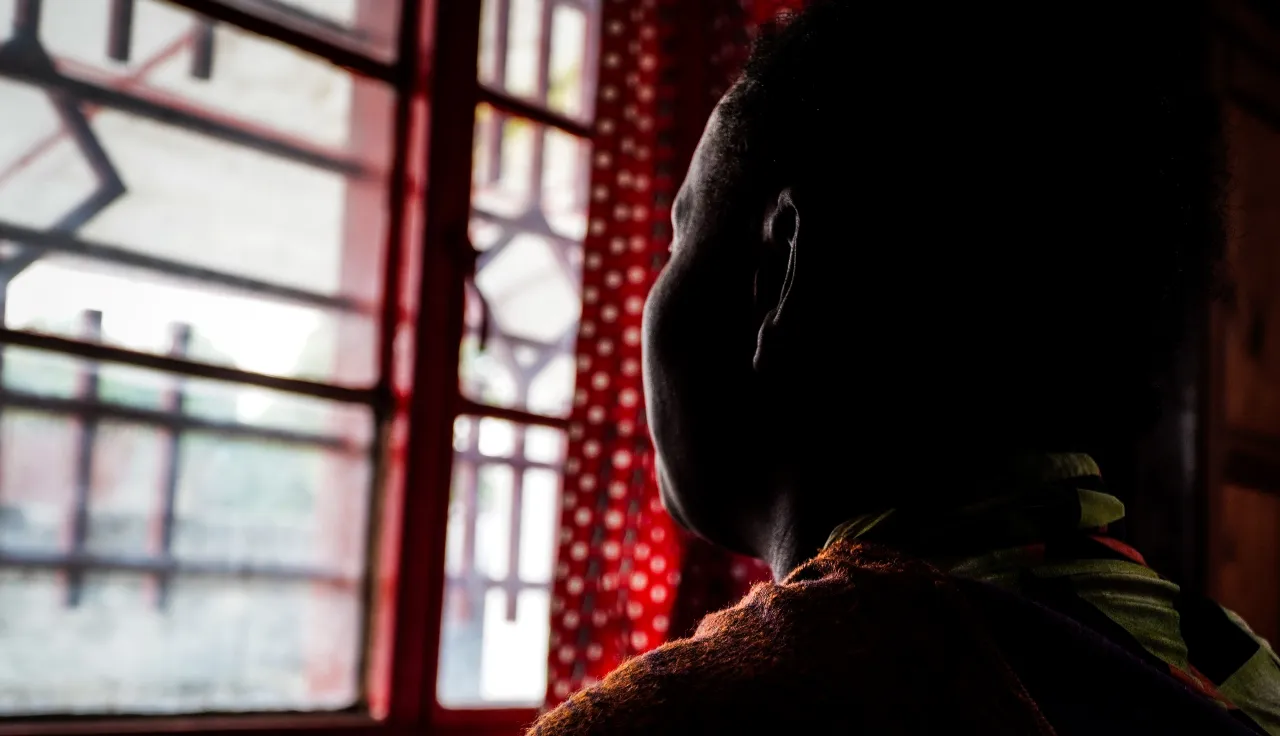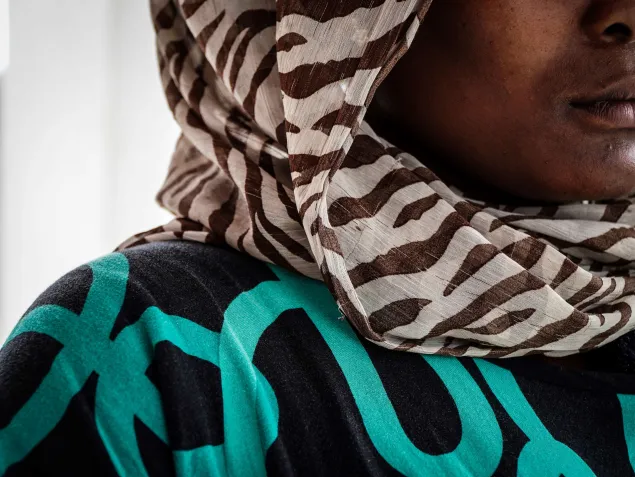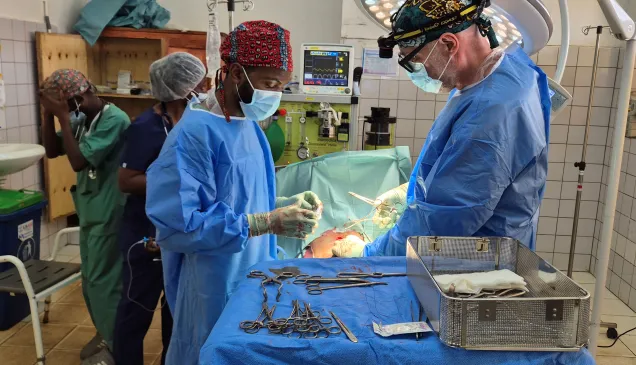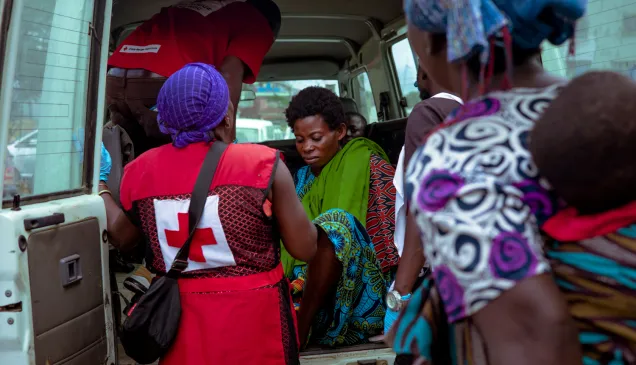DRC: Silence, a slow killer

In the provinces of North Kivu, South Kivu and Ituri in the eastern Democratic Republic of the Congo (DRC) – which has endured the effects of armed conflict for over 30 years – thousands of cases of sexual violence have been recorded at care facilities in recent years.
Many of the victims have not told their loved ones about the trauma they have suffered, for fear of being stigmatized. Some feel safer that way, carrying the mental burden of their suffering in silence. Others have found comfort at counselling centres set up by the Red Cross Society of the Democratic Republic of the Congo (DRC Red Cross).
In many areas affected by conflict, including Ituri, South Kivu and North Kivu, hundreds of civilians who have survived sexual violence, particularly women and girls, urgently need psychological support because of the stigma they face.
For 20-year-old Lisa*, the counselling centres are a safe place for victims of sexual violence because of the support and essential shelter they provide. Lisa has a child who was conceived as a result of a gang rape. “It is thanks to the Red Cross that I am still alive”, she explains.
The counselling centres – set up by the DRC Red Cross in Goma and supported by the International Committee of the Red Cross (ICRC) – welcome victims of all types of violence, including sexual violence. Psychosocial support workers listen to victims and provide them with appropriate psychological support, maintaining complete confidentiality. Where necessary, workers refer victims to health-care facilities for free and appropriate medical care.
Victims of sexual violence often dread talking about what they have been through because they are afraid of how others will react and how they will be perceived. It leaves them completely isolated and unsure what to do and how to move on with their lives. Stigmatization tears families apart, breaks up communities and exacerbates victims’ trauma.
“They kicked me out of the house”, explains Lisa. “I was too ashamed to tell my story. Everyone mocked me”, she recalls, talking about the moment her family and community found out that she was pregnant and that the child had been conceived as a result of a gang rape.

Victims of sexual violence are never to blame for what has happened to them. Negative attitudes towards victims can, however, lead to further suffering, with serious long-term consequences: the stigma can be almost as harmful as the act itself.
Twenty-six-year-old Aliwa* fled the town of Masisi with her children when war broke out in the region a few months ago. After an exhausting 60-km journey, they found refuge at a camp for internally displaced people just outside Goma. While she was there, Aliwa was raped by a group of unidentified men.
“If my husband finds out, he might leave me, and I’ll be all alone”, says Aliwa. “I thought that if my family or neighbours found out what had happened, they would want nothing more to do with me. So I didn’t say anything. I already felt alone. I no longer had any friends.”
Aliwa eventually got support when a Red Cross team visited the camp for displaced people to make victims of sexual violence aware of the importance of asking for help.
Counselling centres allow for open discussion
After being treated at a hospital in Goma, with support from the ICRC, Aliwa was referred to one of the counselling centres, where she received mental health support.
Sexual violence has terrible physical and psychological consequences for the victims themselves, and affects families and communities as well. Committing rape and other forms of sexual violence in armed conflict is a serious violation of international humanitarian law (IHL) and is considered a war crime. All parties to a conflict have an obligation to take measures to prevent such acts and to punish any perpetrators. IHL also states that wounded and sick people, including victims of sexual violence who require medical care, must receive the care that they need to the fullest extent practicable and with the least possible delay.
In order to prevent sexual violence in armed conflicts, the ICRC focuses on making parties to conflicts more aware of IHL, regularly highlighting the gravity of crimes such as rape and engaging in an ongoing bilateral dialogue with all parties to conflicts to ensure that they take measures to stop such crimes and prevent them from happening again in the future. The ICRC also reminds the different commanding officers that they are ultimately responsible for making sure these measures are put in place and respected.
In North Kivu, there are already huge numbers of people in need, and so caring for victims of sexual violence is challenging, particularly given the ongoing instability caused by armed conflict and the budget cuts faced by many humanitarian organizations working in this area. But the counselling centres have proven beneficial for many of the victims who do manage to access them.
Zuri*, a 39-year-old woman and mother of seven children, fled the town of Sake, about 25 km away from Goma, only to be raped by five armed men at a site for displaced people on the outskirts of Goma. She now encourages other victims to speak up and to urgently seek care so that they can start to heal.
“I already feel much better”, says Zuri. “I used to weigh 90 kg, but after the rape, I dropped down to 40 kg. At the moment, I’m already up to 75 kg. The treatment that I received at the Red Cross really helped me to recover mentally. I don’t think about what happened anymore.”
“They took care of me. I am really grateful for how well I was treated there. These places are so important. Anyone in a similar situation should visit one of the Red Cross centres to receive care.”
The ICRC works closely with the DRC Red Cross to provide immediate and vital support to victims of sexual violence in areas affected by armed conflict.
Between January and June 2025, the ICRC supported five counselling centres in North Kivu and two others in South Kivu to take care of victims of sexual violence and make them more resilient, so they can better cope with the stigma they face. In addition, teams specializing in economic support continue to help victims in highly vulnerable situations to generate income so that they can start to reintegrate into society. The ICRC also calls on all parties to the conflict and anyone with influence to step up their efforts in this area and to take concrete action to prevent these serious IHL violations.
From January to June 2025, nearly 23,000 victims of violence, including sexual violence, received psychological and psychosocial support at the counselling centres and other facilities supported by the ICRC in Ituri, North Kivu and South Kivu.
*The names of the victims have been changed to maintain their confidentiality and protect their identities.



